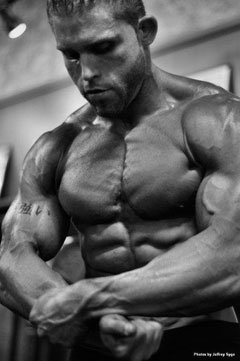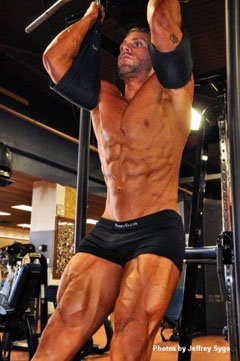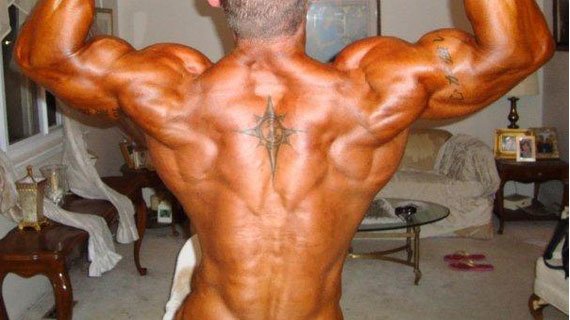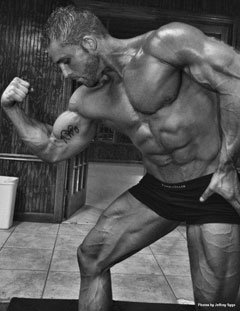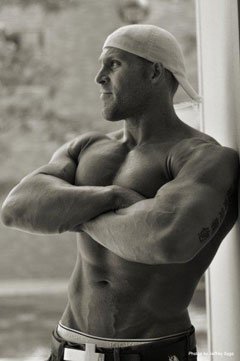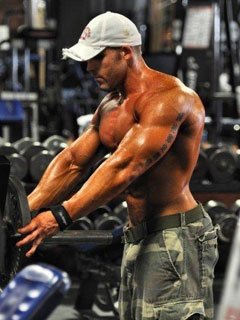 |
Name: Dan McCaw Age: 27 Education/Certification: NASM Certified Personal Trainer, Bachelors in Exercise Science Location: Sterling Heights, Michigan Email: DTMcCaw99@yahoo.com Facebook: Dan McCaw II Twitter: Dan_McCaw Number Of Clients: 3 offseason nutritional clients prepping for local bodybuilding. Two more start up in a few weeks: one on nutrition, and the other both personal training and nutritional meal plan. Rates: Rates are all based on the level of care the person needs, their goals, experience etc. |
Q: Could you tell us a little about your background - personally and professionally?
I'm an old school fat kid really. In 7th grade I was 5-foot-8, 270 pounds starting 7th grade football and was a heavy mess. I was always too tall to play city sports during elementary school. During that time period, I trained martial arts, from which I learned a great deal of discipline and personal strength. Before my school closed and changed locations, I obtained the rank of senior red belt (one belt lower than black belt) in the recognized American Martial Art of Cha Yun Do.
I started junior high and played football and tried to run track. During the course of that year, I lost 95 pounds through proper nutrition and exercise from sports. My younger brother had to lose some weight also for city tackle football. The following summer, going into 9th grade, I became familiar with weights. Then, leading into 10th grade, I totally revamped my entire body. I went to a Michigan State wrestling camp. The guys there turned me on to whey protein. I went home, bought some and a supplement review guide and quickly started my research!
I didn't pay any attention to carbs or fats, so I'd eat a whole box of mac and cheese because it had 50g of protein in it. It didn't matter though, from all the running and ab work I was doing in addition to training a bodybuilder split 5 days per week. I went back into high school in 1999 with a "man" body. People were asking me what I was doing. My training was so pure; I ate clean, wasn't into drinking. It was all about the muscle. During high school I played football and wrestled. In the spring time I went back into martial arts and obtained the rank of first-degree black belt later into my college years.
My personality has always been that of a loner, I always did my own thing regardless of what others thought. This partly came from wrestling and my martial arts background. They were both individual sports I learned to tap into that mind/muscle connection and mental preparation you need in order to go to a place to pull forth that warrior mentality. I'm a Cancer (born July 17) so I run on pure emotion and a lot of time adrenalin (haha).
I referred to this type of mental prep in a recent blog post as "dialing in" referring to that mind connection you must have. Maybe I picked some of this up from being a die-hard Arnold fan and watching "Pumping Iron" too many times ... "the pump" haha.
Professionally I've worked in cardiac rehab, personal training and law enforcement/corrections. All these types of jobs require you to know how to handle and deal with people of all personalities, which I do well; I'm a natural-born leader. I definitely think that my mindset from bodybuilding and martial arts has helped me in life as far as being structured and sticking to a program of time management.
Q: When and why did you become a trainer?
I have trained people since 2002, but I became certified in 2005. As I mentioned earlier, I was a fat kid as a youth. There is no worse feeling than being uncomfortable in your own skin. I realize this and over the years I have taken my body and my mind to a different place. I feel it's what I am meant to do, whether I do it on the side or as a career. People need to be helped or directed in the right path to leading a better lifestyle.
I look back and wonder what kind of athlete I would have been or if I'd be further in my bodybuilding than I am if I just had someone to show me and teach me proper disciplines in these areas versus learning on my own through trial and error on my own body. I can say this though: it has enabled me to learn my body very well and learn many other approaches to help dial in people. The one thing I detest is when a person does one show and they do OK, but all of a sudden they think they can "diet someone down" and they haven't even learned their own body yet.
Just because it worked once doesn't mean it will work again. I have been dieting down over and over again trying new things since high school wrestling and on through almost 5 years of bodybuilding until I took on my first client for show prep this past season. I still do not know everything yet.
Q: What is your training style? What methods do you use?
I don't use any one specific training style. I train instinctively, if you would like to call that a style, but I go by feel and listen to my body. As far as sets and reps: I cycle them just as you would diet and supplementation. The set volume is anywhere from 12-20 sets per muscle and reps vary at different phases of my diet from 8-10 reps to 20-30 reps sometimes. I will incorporate supersets, drop sets, rest pause sets and strip sets in order to change up intensity levels.
Q: Do you have examples of success stories from clients using your methods?
My best success story is myself, losing 95 pounds through proper nutrition. I'm proud of my uncle who is now at the age of 50. We are in his first offseason prior to his precomp phase for his first show. Back in 2008 he was going through a rough time and I was prepping for a show so I started to take him to the gym. The family as a whole was going through a rough time. My grandmother was progressively getting worse and dying of cancer.
So between that and other personal issues, my uncle wore out. He was weighing approximately 135 pounds at 5-foot-8 1/2 inches tall. He looked sickly to put it nicely. I took him to see a hormone specialist; he was diagnosed with a thyroid issue and his hormone levels were low. In one year's time through doctor's care and my nutrition and training philosophies, I brought him back to health, weighing 185 pounds looking healthy as ever. His doctors were shocked. Since then he follows bodybuilding, goes to every show of mine and reads muscle magazines religiously.
He loves his pre/post workout and whey protein. It totally changed his lifestyle, so I said to him about a month ago "You are doing a show." He cocked his head at me looked around Powerhouse at the big guys and said, "Do you really think I can do that?!" I said, "hell yeah bro!" So it's on now and I couldn't be more proud of him to take the challenge at his age.
My other clients are beginners and I'm looking for a promising season from my two local level bodybuilders this upcoming season.
Q: Who are some of your most notable clients?
I don't have any notable clients such as famous people or top athletes. I choose not to take them. I want to train people who are at a novice level. I have learned to help them well. For instance I won't take on a national level bodybuilder for prep work until I can dial it in and place in the top spots. More or less, lead by example.
I have consulted and tossed idea back and forth with a few good friends who are pro level bodybuilders (which I will leave nameless for this time) but I can say it was nice to have them asking me questions on what I thought they were doing with their prep and taking some of my advice. But I do keep up on my info about many different areas and maybe it's something they hadn't done in a while and needed to be reminded about or just needed an outside opinion.
Q: Can you please you give me an example diet and training program you put together for your clients?
My clients' diets are all different and relative to the client and their body type. Depending on body fat levels, I may throw them into keto for two weeks just to get rid of some excess weight. This happens when someone enjoys cheat days vs. cheat meals in their offseason. We have all done it (haha) the diet looks something like this.
Wake up do cardio walking 120-130 bpm for 45 minutes.
Meal 1:
-

Whole Omega Eggs
6 eggs
Meal 2:
Meal 3:
-

Whey Isolate
60 grams
-

Natural Almond Butter
1 tbsp
Meal 4:
-

Sirloin
6-8 ounces
-

Green Salad
1 salad
-

Vinegar
1 tbsp
-

Olive Oil
1 tbsp
Meal 5:
Meal 6:
Then I will bring carbs back in. At this point the person probably lost 10 pounds of water and fat. This phase of the diet depends on someone's body type and body weight. Typically I like to do a higher protein/moderate carb, low fat to start. Like a 50/35/15 protein/carb/fat ratio. Also I like to use a carb source from oats, brown rice, red potato and sweet potato. The same goes with protein sources, one from each.
My most recent diet was a little different than those ratios. It was higher carbs than usual and lower protein than I usually do and no added fats. This allowed me to do HIIT style cardio and not be on a treadmill for hours. This doesn't work for everyone and is relative to your off-season intakes and conditioning also.
Here is a 10-8 week out sample diet.
Upon Waking
-

Water
1 liter
-

Coffee
1 cup
Meal 1:
-

Rolled Oats
1 cup
-

Egg Whites
4 whites
-

Chicken
8 ounces
Meal 2:
Meal 3:
-

White Fish
8 ounces
-

Red Potato
8 ounces
Meal 4:
-

Chicken
8 ounces
-

Sweet Potato
8 ounces
-

Natural Peanut Butter
1 tbsp
Meal 5:
-

Broccoli
1 1/2 cups
-

White Fish
10 ounces
Meal 6:
-

Spinach/Romaine/Cucumber Salad
1 large salad
-

Almond Oil
1 tbsp
-

Apple Cider Vinegar
3 tbsp
At this point in the phase of dieting, most athletes are not building muscle any longer, so to keep GH levels up to burn more fat we do not have any carbs post-workout. From here out they are just to keep some fullness to the muscle and for energy. If muscles look a bit flat, we may add some more fats in, and if the athlete is slowing down progress, we may throw in a high-carb day or two to ramp up the metabolism. From here out, one week we may lower carbs a bit or add cardio depending on conditioning.
Q: What are the most common mistakes a client makes?
Not "buying into the program." We have all done it, I will admit I have! And I regret it! I had one client I actually did help prepare for the North Americans (and yes, I said I wouldn't/don't do national level prep for people). His camp bailed on him and he was referred by a good friend. He was a welterweight and I only had about 6 weeks with him, but he made crazy gains in that time and the depletion program I had set for him was perfect.
He sent me a picture the day of the show with feathered quads and shredded glutes. Then I saw his contest pics and I said "So what did you eat that wasn't on the meal plan, because there's no way you should have not filled out and looked smoother than the morning?!" He lowered his head and told me. It had thrown him off and ultimately took him from 2nd to 4th. He did get good reviews and feedback however and one thing was agreed on, he should have been in a heavier class but that's all offseason work. We did well with what he had and that was based from poor guidance on his old crew's behalf. This year is promising for him as well, he starts his off-season bulk phase in 2 weeks.
Q: What are the most common mistakes you believe a trainer makes?
Not listening to client's feedback about what they are feeling. If a client says I feel this way or that way in relation to food they are eating, you have to take a second look at pics or see them in person. Chances are they are just being crazy (like we all are when dieting). For instance, like with myself, I know my body well. I have done all my own prep work and done rather well, but I now work with someone. At first they did not take into consideration that I know my stuff.
After a conversation or two we got on the same page and this off-season and next pre-competition look promising. I'm confident handing over control to my guy. At the national level it's much better to have a few sets of eyes. With my busy work schedule and clients, to not need to think and stress about my own prep allows me to be better at other things I have going on. Lesson of the day - communicate!
Q: Do you set your clients up with a full diet and training plan for them to follow by themselves?
I prefer to work with someone for a full year. I can learn their body. I can learn what foods work best for them in conjunction with what training style they respond to best. I do more of the nutritional prep than I do 1-on-1 training. But I do take these clients to the gym and put them through workouts periodically as well as work on their posing. This allows them to see and know what I expect when they are on one of my nutrition plans.
I also set forth a workout relative to the food and sups they eat. I learned this through following people like Hany Rambod, George Farah and Neil Hill. These trainers are on a much higher level than me, but the principles for success are all the same. There must be a synergistic combination of elements in the program.
Q: How do you keep your clients motivated?
On my facebook I post a lot of quotes, training videos or just my own thoughts and feelings about myself. This started out as a way to motivate myself, then I started getting messages about how it all helped.
I also will go in the gym and blast them on a workout. I push them to their limit and then some. They know they can move the weight. They can do the workout even though they diet or train alone.
If that doesn't work, I show them other people who want the same results as they do and the lengths those people go to, to achieve results.
Q: Do you train a male client differently to a female?
I work with both males and females and train them based on their weak areas. I provide them different diets because men and women add muscle and store body fat much differently. You can't assign the same nutrition or supplements for them. So my answer is 'yes' in several different ways, depending on results. But training is always intense, regardless of gender.
Many women think they will get big muscles if they go heavy and this simply isn't true. Muscle growth is relative to hormone and nutrient intakes. Women won't grow as much as men because they don't have as much testosterone naturally. It's impossible. They also cannot eat the same calorie intake. Without optimum hormone levels, high amounts of food and rest, it will not matter how heavy a female trains; she will not grow like a man. This is a huge misconception I usually have to address when I train a woman.
Q: How have you changed your approach to clients over the years?
I wouldn't say it changed as much it has evolved into something more specific. I always understood that everyone is different, so you can't do that cookie-cutter approach, and I never have. So in some ways it is still the same and in many ways it's different.
Q: How do you start a client on a new program? Do you do some kind of assessment?
I get a medical history. Depending on age, I may ask for a physical and blood work too. Then I'll take them through the gym and test their ability on different exercises. I look at posture, hip/knee placement, form and core strength. This allows me to see what areas we must make stronger before getting nasty!
For diet, I ask for a week's worth of eating, everything they put in their mouth and when. Then I base a diet off that. Of course I assess their physical appearance as well.
Q: Do you prefer to train male or female clients and why?
Most times I'd say female, because many males bring their ego with them. If they have any bit of skill, they almost feel the need to question you and butt heads with you or tell you what they used to do and why they want to do it again. News flash: Doing it your way is the reason why you decided to consult and hire me; doing it your way is why you have no results! Sorry if that seemed a bit intense, but I cannot stand ego. That would be like if Jay Cutler gave me a tip on how to be better and I said no thanks. This is why I say female. They do what I say when and how I say it, and sometimes work harder than the guys.
Q: Do you feel just as much like a psychologist as you do a personal trainer?
Sure do! Many times you develop relationships with your clients, especially the ones dieting versus the ones bulking. They are so worried they aren't doing it right. Once they get a handle on that, they direct other issues they may have and vent to you, which is fine ... during cardio or outside training time. That's misplaced focus and we don't need negativity during training. I have no problem throwing down a Dr. Phil session, but at the right time.
Know Another Great Trainer?
Sign Them Up For The Personal Trainer Of The Month!
Do you have a personal trainer that deserves to be a Bodybuilding.com Personal Trainer of the Month? Submit them to ptmonth@bodybuilding.com.

